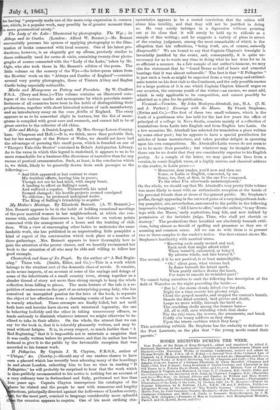Versiculi — Verselets. By John Hoskyns-Abrahall, jun., MA. (J. H. and J.
Parker.) Evenings with the Muses. By Frank Stephens. (Ewins and Co.)—The first of these two small volumes, which is the work of a gentleman who has held for the last few years the office of principal of a college in Nova Scotia, consists mainly of a collection of translations from Latin into English and from English into Latin. On a few occasions Mr. Abrahall has selected for translation a piece written by some other poet ; but he appears to have a special predilection for articles of home manufacture, and takes peculiar delight in operating upon his own compositions. Mr. Abrahall's Latin verses do not seem to us to be more than passable ; but whatever may be thought of them, there can be no doubt that they are considerably superior to his English poetry. As a sample of the latter, we may quote four lines from a version, in comic English verse, of a highly serious and classical address to the reader, in Latin prose :—
" Moreover, dear reader, you'll now and then see Some, or Latin or English, concocted, by me.
Some, too, that, at first, in the one I've composed, To the other I've afterwards metamorphosed."
On the whole, we should say that Mr. Abrahall's very pretty little volume was more likely to meet with an enthusiastic reception at the hands of his yersenal friends than at those of the general public. Mr. Stephens's poems, though appearing in the outward guise of a very insigniiicant-look- ing pamphlet, are, nevertheless, announced to the public in the following impressive language: "All I have to offer," says the author, "is my 'Even- ings with the Muses,' early aspirations, long felt, and now indited by permission of the inviolate judge, Time, who shall yet cherish or destroy." The productions thus heralded are absolutely beneath criti- cism, being almost as devoid of spelling and grammar as they are of meaning and common sense. All we can do with them is to present two or three samples to the reader's notice. Our first extract shows Mr. Stephens's familiarity with nautical terms.
"Knowing each sandy mound and reef, Each nook that might afford relief When 'numb'd, exhausted, or belay'd By adverse winds, and fate betray'd."
The second, if it be not poetical, is at least unintelligible.
" Oh ! silent gaze, what visions lurk In flame beneath the latent spark, When pearly surface drains the heart, For tears to smooth its wrinkled part?"
We cannot bring ourselves to omit the following fine description of the field of Waterloo on the night preceding the battle :—
" But lo ! the storm clouds drivel o'er the plain, Night for a time asserts her gloomy reign, Cloud the gorged mouths, and stopped the cannon's breath. Stands the fixed sentinel, 'mid groves and death, Leaps no more wildly, through the lurid air,
The crackling shells among the foemen bare—
All, all is still, save whistling winds that shake
The the (sic) trees, the towers, the armaments, and break Coldly o'er weary soldiers as they sleep
Upon the trusty carbines which they keep."
This astonishing rubbish Mr. Stephens has the audacity to dedicate to the Poet Laureate, on the plea that "the young nestle round their parents."






























 Previous page
Previous page